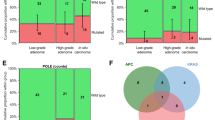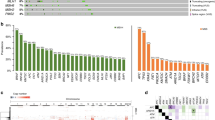Abstract
In colorectal cancer (CRC) oncogenic mutations such as KRAS alterations, are considered standard molecular biomarkers that predict the clinical benefit for targeted intervention with epidermal growth factor receptor (EGFR) inhibitors. In addition, these mutations are associated with specific anatomical area in colon tumor development, as BRAF mutations with the microsatellite instability (MSI). In this translational study, we aimed to assess the mutation frequencies of the EGFR (hotspot area and polyadenine deletions A13_del), KRAS, BRAFV600E, and PIK3CA oncogenes in a series of 280 CRC patients. MSI phenotypes are also considered in this series. All patients' clinicopathological data were assessed for statistical analysis and its associations were validated. We verified multiple associations between oncogenic mutations and determined clinicopathological tumor features (1) EGFR A13_deletions are associated with right colon carcinoma (P<0.005), mucinous histotype (P=0.042), G3 grading (P=0.024), and MSI status (P<0.005); (2) PIK3CA mutations are related mucinous histotype (P=0.021); (3) KRASG12 and KRASG13 mutations are correlated, respectively, with the left and right colon cancer development (P<0.005), and finally (4) MSI is associated with right colon tumors (P<0.005). Mostly, we verified a higher frequency rate of the KRASG13 and EGFR A13_del oncogene mutations in right colon cancer; whereas KRASG12 codon mutation occurs more frequently in left colon cancers. In particular, we assessed that right vs left colon cancer are associated with specific molecular characteristics. These evidences, in association with clinicopathological data, can delineate novel approaches for the CRC classification and targeted intervention.
Similar content being viewed by others
Log in or create a free account to read this content
Gain free access to this article, as well as selected content from this journal and more on nature.com
or
References
Imajo M, Tsuchiya Y, Nishida E : Regulatory mechanisms and functions of MAP kinase signaling pathways. IUBMB Life 2006; 58: 312–317.
Carpenter G, Cohen S : Epidermal growth factor. J Biol Chem 1990; 265: 7709–7712.
Quian XL, Decker SJ, Greene MI : p185c-neu and epidermal growth factor receptor associate into a structure composed of activated kinases. Proc Natl Acad Sci USA 1992; 89: 1330–1334.
Lynch TJ : The evolving story of the epidermal growth factor receptor as a target for non-small-cell lung cancer. Clin Adv Hematol Oncol 2004; 2: 786–787.
Artale S, Sartore-Bianchi A, Veronese SM et al: Mutations of KRAS and BRAF in primary and matched metastatic sites of colorectal cancer. J Clin Oncol 2008; 26: 4217–4219.
Allegra CJ, Jessup JM, Somerfield MR et al: American Society of Clinical Oncology provisional clinical opinion: testing for KRAS gene mutations in patients with metastatic colorectal carcinoma to predict response to anti-epidermal growth factor receptor monoclonal antibody therapy. J Clin Oncol 2009; 27: 2091–2096.
Velho S, Oliveira C, Seruca R : KRAS mutations and anti-epidermal growth factor receptor therapy in colorectal cancer with lymph node metastases. J Clin Oncol 2009; 27: 158–159.
Yen LC, Uen YH, Wu DC et al: Activating KRAS mutations and overexpression of epidermal growth factor receptor as independent predictors in metastatic colorectal cancer patients treated with cetuximab. Ann Surg 2010; 251: 254–260.
Metzger B, Chambeau L, Begon DY et al: The human epidermal growth factor receptor (EGFR) gene in European patients with advanced colorectal cancer harbors infrequent mutations in its tyrosine kinase domain. BMC Med Genet 2011; 12: 144.
Nagahara H, Mimori K, Ohta M et al: Somatic mutations of epidermal growth factor receptor in colorectal carcinoma. Clin Cancer Res 2005; 11: 1368–1371.
Yuan Z, Shin J, Wilson A et al: An A13 repeat within the 3'-untranslated region of epidermal growth factor receptor (EGFR) is frequently mutated in microsatellite instability colon cancers and is associated with increased EGFR expression. Cancer Res 2009; 69: 7811–7818.
Deqin M, Chen Z, Nero C et al: Somatic deletions of the polyA tract in the 3′ untranslated region of epidermal growth factor receptor are common in microsatellite instability-high endometrial and colorectal carcinomas. Arch Pathol Lab Med 2012; 136: 510–516.
Velho S, Corso G, Oliveíra C, Seruca R : KRAS signaling pathway alterations in microsatellite unstable gastrointestinal cancers. Adv Cancer Res 2010; 109: 123–143.
Miyaki M, Iijima T, Yamaguchi T et al: Mutations of the PIK3CA gene in hereditary colorectal cancers. Int J Cancer 2007; 121: 1627–1630.
Gulhati P, Zaytseva YY, Valentino JD et al: Sorafenib enhances the therapeutic efficacy of rapamycin in colorectal cancers harboring oncogenic KRAS and PIK3CA. Carcinogenesis 2012; 33: 1782–1790.
Corso G, Velho S, Paredes J et al: Oncogenic mutations in gastric cancer with microsatellite instability. Eur J Cancer 2011; 47: 443–451.
Corso G, Pedrazzani C, Marrelli D, Pascale V, Pinto E, Roviello F : Correlation of microsatellite instability at multiple loci with long-term survival in advanced gastric carcinoma. Arch Surg 2009; 144: 722–727.
Phipps AI, Scoggins J, Rossing MA, Li CI, Newcomb PA : Temporal trends in incidence and mortality rates for colorectal cancer by tumor location: 1975-2007. Am J Public Health 2012; 102: 1791–1797.
Kalady MF, Dejulius KL, Sanchez JA et al: BRAF mutations in colorectal cancer are associated with distinct clinical characteristics and worse prognosis. Dis Colon Rectum 2012; 55: 128–133.
Wong R : Proximal tumors are associated with greater mortality in colon cancer. J Gen Intern Med 2010; 25: 1157–1163.
Li FY, Lai MD : Colorectal cancer, one entity or three. J Zhejiang Univ Sci B 2009; 10: 219–229.
Benedix F, Schmidt U, Mroczkowski P, Gastinger I, Lippert H, Kube R : Study Group ‘Colon/Rectum Carcinoma (Primary Tumor)’: Colon carcinoma—classification into right and left sided cancer or according to colonic subsite?—Analysis of 29,568 patients. Eur J Surg Oncol 2011; 37: 134–139.
Oliveira C, Westra JL, Arango D et al: Distinct patterns of KRAS mutations in colorectal carcinomas according to germline mismatch repair defects and hMLH1 methylation status. Hum Mol Genet 2004; 13: 2303–2311.
Sylvester BE, Huo D, Khramtsov A et al: Molecular analysis of colorectal tumors within a diverse patient cohort at a single institution. Clin Cancer Res 2012; 18: 350–359.
Roth AD, Tejpar S, Delorenzi M et al: Prognostic role of KRAS and BRAF in stage II and III resected colon cancer: results of the translational study on the PETACC-3, EORTC 40993, SAKK 60-00 trial. J Clin Oncol 2010; 28: 466–474.
Webster J, Kauffman TL, Spencer Feigelson H et al: KRAS testing and epidermal growth factor receptor inhibitor treatment for colorectal cancer in community settings. Cancer Epidemiol Biomarkers Prev 2012; 22: 91–101.
Cai G, Xu Y, Lu H et al: Clinicopathologic and molecular features of sporadic microsatellite- and chromosomal-stable colorectal cancers. Int J Colorectal Dis 2008; 23: 365–373.
Gryfe R, Kim H, Hsieh ET et al: Tumor microsatellite instability and clinical outcome in young patients with colorectal cancer. N Engl J Med 2000; 342: 69–77.
Malesci A, Laghi L, Bianchi P et al: Reduced likelihood of metastases in patients with microsatellite-unstable colorectal cancer. Clin Cancer Res 2007; 13: 3831–3839.
Clark AJ, Barnetson R, Farrington SM, Dunlop MG : Prognosis in DNA mismatch repair deficient colorectal cancer: are all MSI tumours equivalent? Fam Cancer 2004; 3: 85–91.
Arnold CN, Goel A, Boland CR : Role of hMLH1 promoter hypermethylation in drug resistance to 5-fluorouracil in colorectal cancer cell lines. Int J Cancer 2003; 106: 66–73.
Carethers JM, Chauhan DP, Fink D et al: Mismatch repair proficiency and in vitro response to 5-fluorouracil. Gastroenterology 1999; 117: 123–131.
Carethers JM, Smith EJ, Behling CA et al: Use of 5-fluorouracil and survival in patients with microsatellite-unstable colorectal cancer. Gastroenterology 2004; 126: 394–401.
Des Guetz G, Uzzan B, Nicolas P, Schischmanoff O, Morere JF : Microsatellite instability: a predictive marker in metastatic colorectal cancer? Target Oncol 2009; 4: 57–62.
Des Guetz G, Schischmanoff O, Nicolas P, Perret GY, Morere JF, Uzzan B : Does microsatellite instability predict the efficacy of adjuvant chemotherapy in colorectal cancer? A systematic review with meta-analysis. Eur J Cancer 2009; 45: 1890–1896.
Des Guetz G, Uzzan B, Nicolas P, Schischmanoff O, Perret GY, Morere JF : Microsatellite instability does not predict the efficacy of chemotherapy in metastatic colorectal cancer? A systematic review and meta-analysis. Anticancer Res 2009; 29: 1615–1620.
Ribic CM, Sargent DJ, Moore MJ et al: Tumor microsatellite-instability status as a predictor of benefit from fluorouracil-based adjuvant chemotherapy for colon cancer. N Engl J Med 2003; 349: 247–257.
Sinicrope FA, Sargent DJ : Clinical implications of microsatellite instability in sporadic colon cancers. Curr Opin Oncol 2009; 21: 369–373.
Oliveira C, Pinto M, Duval A et al: BRAF mutations characterize colon but not gastric cancer with mismatch repair deficiency. Oncogene 2003; 22: 9192–9196.
Campbell IG, Choong D, Chenevix-Trench G : Kathleen Cuningham Foundation Consortium for Research into Familial Breast Cancer: No germline mutations in the histone acetyltransferase gene EP300 in BRCA1 and BRCA2 negative families with breast cancer and gastric, pancreatic, or colorectal cancer. Breast Cancer Res 2004; 6: R366–R371.
Samuels Y, Velculescu VE : Oncogenic mutations of PIK3CA in human cancers. Cell Cycle 2004; 3: 1221–1224.
Velho S, Oliveira C, Ferreira A et al: The prevalence of PIK3CA mutations in gastric and colon cancer. Eur J Cancer 2005; 41: 1649–1654.
Liao X, Morikawa T, Lochhead P et al: Prognostic role of PIK3CA mutation in colorectal cancer: cohort study and literature review. Clin Cancer Res 2012; 18: 2257–2268.
Acknowledgements
We thank all the patients who donated tissue samples for this study. This work was supported by Grants from the Istituto Toscano Tumori (‘Gene expression profile and therapeutic implication in gastric cancer. From the clinical overview to the translational research’ Grant ITT-2007).
Author information
Authors and Affiliations
Corresponding authors
Ethics declarations
Competing interests
The authors declare no conflict of interest.
Rights and permissions
About this article
Cite this article
Corso, G., Pascale, V., Flauti, G. et al. Oncogenic mutations and microsatellite instability phenotype predict specific anatomical subsite in colorectal cancer patients. Eur J Hum Genet 21, 1383–1388 (2013). https://doi.org/10.1038/ejhg.2013.66
Received:
Revised:
Accepted:
Published:
Issue date:
DOI: https://doi.org/10.1038/ejhg.2013.66
Keywords
This article is cited by
-
Microsatellite instability in gastrointestinal cancers
European Journal of Human Genetics (2022)
-
Association of microsatellite instability (MSI) status with the 5-year outcome and genetic ancestry in a large Brazilian cohort of colorectal cancer
European Journal of Human Genetics (2022)
-
Mutations of key driver genes in colorectal cancer progression and metastasis
Cancer and Metastasis Reviews (2018)
-
Clinical baseline and prognostic difference of platelet lymphocyte ratio (PLR) in right-sided and let-sided colon cancers
BMC Cancer (2017)
-
Segmental distribution of some common molecular markers for colorectal cancer (CRC): influencing factors and potential implications
Tumor Biology (2016)



